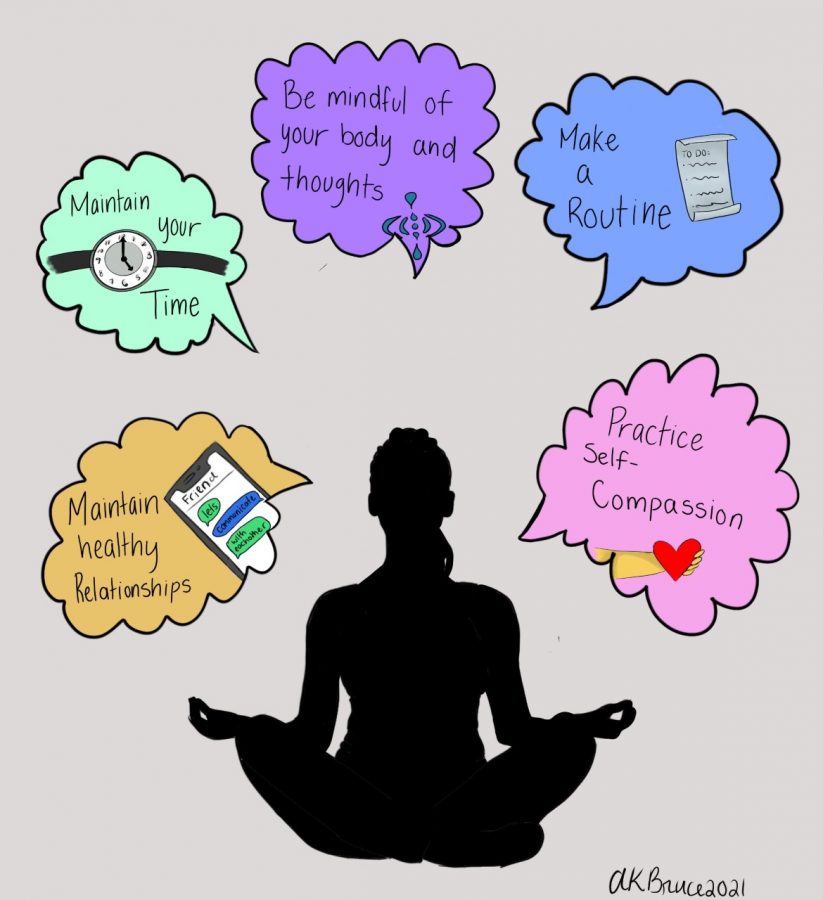5 easy tips to help you de-stress
January 28, 2021
Let’s be honest, no one is perfect when it comes to dealing with stress. It’s way easier to eat your weight in Goldfish crackers and drink 4 cups of coffee than to sit down and address how to properly conquer your stressors, but it’s worth it.
While the stress of life can easily pile up, it doesn’t have to overwhelm you. Especially now, for students balancing school, bills, work and COVID-19, stress can take its toll. Miriam Saucedo, a Linfield mental health counselor has a few suggestions for students.
“Now more than ever, there’s a different weight that can be felt,” said Saucedo.“If we aren’t aware of how we are managing and coping with our stress, it can actually increase our stress.”
Saucedo is part of the Linfield counseling staff specializing in individual and group therapy. She received her masters in clinical mental health counseling from George Fox University and has since worked with young adults in both residential mental health as well as on the Linfield campus.
The key to managing your stress may lie in these five easy tips:
1. Make a routine
Setting a routine may seem like common sense, but planning out your day allows you complete all required tasks without the worry you forgot something. It also helps reduce anxiety over new and unexpected obstacles that may arise throughout the day and demand your attention. In having a routine, you know what you must do that day, allowing for free time, time for those unexpected obstacles, or simply a little relaxation.
2. Time management
It’s true, procrastination is truly an art form but a highly stressful one at that. Managing your time wisely instead of saving assignments or tasks for the last minute will take a load of your shoulders. Effective time management can often be difficult, but is achievable, often with a planner or calendar that helps physically show you what needs to be accomplished. In doing so, you’ll be able to have time set aside for the tasks you must do, as well as time for things you’d like to do.
3. Being aware of your body and thoughts
It’s fairly common to ignore signs from your body when stressed. Eating and sleeping when you can instead of maintaining a regular balanced schedule may seem easier, but in the long run, ignoring the physical sensations your body gives off can be damaging. Becoming sick is often a result. Being aware of your thoughts is important too. If you find yourself actively and continually stressing over something, it might be time to take a step back, grab a snack and take a break.
“Headaches are a common side effect we see when dealing with stress,” Saucedo admitted. “If it’s chronic, meaning it doesn’t ebb and flow but stays constant, it can lead us to fail to take care of ourselves. That’s when we start to see the ripple effects of fatigue-headaches, body aches, and other physical ailments.”
4. Practicing self-compassion
No one is perfect, yet most students hold themselves to a very high standard in order to achieve the academic standing they desire. Recognizing that oftentimes this behavior will cause excess amounts of stress is essential. Be kind to yourself. Self-compassion doesn’t necessarily mean self-indulgence, it may just mean approaching how you treat yourself as you would a friend, instead of as an enemy.
5. Healthy relationships
Healthy relationships are incredibly important, and not necessarily just romantic ones. Friends are often pillars of strength and guidance when it comes to navigating life, so recognizing which ones are harmful and distancing yourself from them may help ease some of your stress. Identify your support groups, be open to letting go of toxic relationships and you’re one step closer to conquering your stress.
There’s no shame in admitting you’re stressed and unsure how to deal with it. These are only a few helpful practices offered by Saucedo. For more, a stress-workshop is being offered every Wednesday over Zoom at 4pm for Linfield students.
“You can get feedback and other skills that might be helpful for coping with some stuff that’s going on,” said Saucedo. “This is a place for people to listen and know that they’re not alone.”

